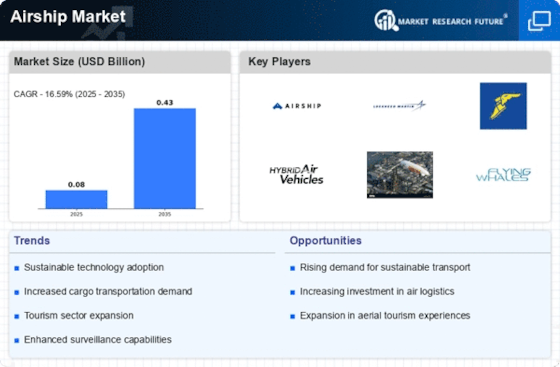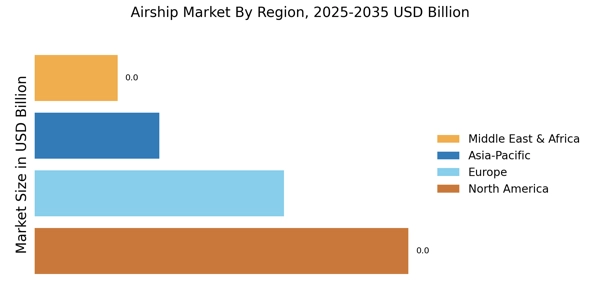Cost-Effectiveness
Cost-effectiveness is emerging as a significant driver in the airship Market. Compared to traditional aircraft, airships generally incur lower operational costs, including fuel and maintenance expenses. Their ability to carry heavy payloads over long distances without the need for extensive ground infrastructure further enhances their economic viability. As businesses seek to optimize logistics and reduce transportation costs, airships present an attractive solution. Recent evaluations indicate that airships can operate at a fraction of the cost of conventional freight transport, making them a compelling option for companies looking to improve their bottom line. This cost advantage is likely to stimulate interest and investment in the Airship Market, fostering growth and innovation.
Regulatory Support
Regulatory support is increasingly shaping the landscape of the Airship Market. Governments are recognizing the potential of airships as a sustainable transportation alternative and are implementing policies to encourage their development. This includes streamlining certification processes and providing incentives for companies investing in airship technology. As regulations evolve to accommodate the unique characteristics of airships, the industry is likely to experience accelerated growth. Furthermore, international collaborations aimed at establishing safety standards and operational guidelines are fostering a more conducive environment for airship operations. Market forecasts suggest that regulatory support could significantly enhance the attractiveness of the Airship Market, potentially leading to a surge in new entrants and innovations.
Diverse Applications
The versatility of airships is a key driver in the Airship Market. These aerial vehicles are increasingly utilized across various sectors, including logistics, advertising, and surveillance. Their ability to operate in remote areas and deliver goods without the need for extensive infrastructure makes them particularly appealing for logistics companies. Moreover, airships are being employed for promotional purposes, offering unique advertising opportunities that capture public attention. The surveillance sector is also recognizing the benefits of airships, as they can provide extended aerial coverage for monitoring purposes. Market analysis suggests that the demand for airships in these diverse applications could lead to a market expansion, with projections indicating a potential market size increase of over 15 billion dollars by 2030.
Technological Innovations
Technological advancements play a pivotal role in shaping the Airship Market. Innovations in materials, such as the development of lightweight composites, enhance the performance and efficiency of airships. Additionally, advancements in navigation and control systems improve safety and operational capabilities. The integration of automation and artificial intelligence is also transforming airship operations, allowing for more precise maneuvering and reduced operational costs. Recent studies indicate that the airship market could experience a compound annual growth rate of over 10%, driven by these technological improvements. As companies invest in research and development, the Airship Market is poised for significant growth, attracting interest from various sectors, including logistics, tourism, and surveillance.
Sustainability Initiatives
The Airship Market is increasingly influenced by sustainability initiatives. As environmental concerns rise, companies are seeking eco-friendly transportation solutions. Airships, with their lower carbon footprint compared to traditional aircraft, present a viable alternative. The industry is witnessing a shift towards using lighter-than-air technology, which utilizes less fuel and emits fewer greenhouse gases. This trend aligns with global efforts to reduce emissions and combat climate change. Furthermore, the adoption of renewable energy sources for airship operations is gaining traction, enhancing their appeal. According to recent data, the airship sector could potentially reduce emissions by up to 80% compared to conventional air transport. This focus on sustainability is likely to drive investments and innovations within the Airship Market.

















